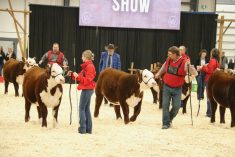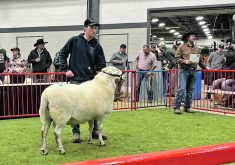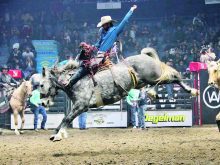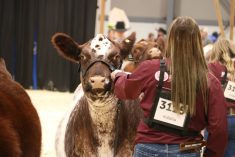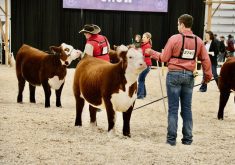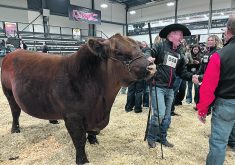REGINA— Canadian Western Agribition is family vacation time for Sara and Erin Hepper, who leave their Alberta jobs behind for a week to join their parents, Terry and Lynette, to show cattle at the international event.
The family owns about 50 Limousin cows at Eden Meadows Farm near Zehner, Sask.
“We want quality. We don’t necessarily need huge numbers,” said Lynette.
Terry said the farm is close to Regina, and the land base does not allow for much more expansion.
He has spent nearly a lifetime with the breed and is currently president of the Canadian Limousin Association.
Read Also

Beef check-off collection system aligns across the country
A single and aligned check-off collection system based on where producers live makes the system equal said Chad Ross, Saskatchewan Cattle Association chair.
You can find all our Canadian Western Agribition 2016 coverage here.
He got into the business when he was 12 with encouragement from an uncle who helped him acquire commercial cows.
When he first came to Agribition as a youngster in the early 1970s, he witnessed the heyday of the continental cattle and saw a female sell for $52,000.
He showed for the first time in 1974 and admits his results were “terrible.”
Since then, the family has stood many times in the supreme champion show arena with grand champion bulls and females.
Lynette is with Saskatchewan Agriculture’s lands branch and Terry worked for Viterra until last year. He prefers life on the farm.
“I love working with cattle.”
The Heppers married in 1982, and life is full with work, volunteering, showing and selling cattle. There is also a good division of duties.
Sara trains and shows the animals and Erin fits cattle with Terry.
Both daughters live in Alberta. Sara and her partner have a heavy duty mechanic business and service the oilfield.
Erin is executive director of the Drayton Valley Community Foundation, which handles corporate and individual endowment funds. Her partner has a pressure truck business that services the oil patch.
They have showed as a family at Agribition, Brandon, Farmfair and a Manitoba circuit in which a show is held in a different town every day for five days.
“Last year, Sara and I went by ourselves,” Lynette said.
“It was our maiden voyage, and we just took the truck and trailer and a couple animals and away we went.”
Their newest venture is expanding their embryo transplant business to make the most of their small cow herd.
“We are just getting into that, and it has been a very good success for us. We got some very good offspring from that,” she said.
“Last year we got the herdsman award at Agribition for the most improved cattle. Our cattle quality has definitely improved.”
Being involved with a purebred association can open up the world to a farm family.
Last year, Terry and Lynette travelled to Ireland for the world conference, and they were able to compare European style cattle to what has been developed in North America.
Limousin is the most popular breed there. They are traditional red in colour, and many still have horns.
“They have way more muscling,” Lynette said. “They are bigger framed animals. There were cows that were 2,800 pounds.”
Limousin-influenced cattle won for more than 20 consecutive years when Agribition still held carcass competitions, and now the breed is working to rebuild itself.
Focus groups were held in Calgary a couple years ago with breeders, commercial producers, processors and retailers to see where Limousin fit in the beef business.
“I got my eyes opened,” Terry said. “We talked to the packers in Western Canada, and they don’t want Limos, whereas in Eastern Canada they really like them because of the double muscling. Their markets are different.”
Membership and registrations are stable in Canada.
“We are starting to get more people looking at the Limo bulls again. That is positive,” he said.






